|
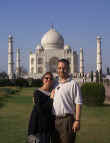 Mar. 11-17, 1999 Agra,
Khajuraho, and Varanasi, India Mar. 11-17, 1999 Agra,
Khajuraho, and Varanasi, IndiaAgra
I'd seen its image in hundreds of photographs, paintings, and the like. Shamelessly
adorning countless brochures, postcards, books, maps, and restaurant menus - anything
remotely related to India. It was the Taj Mahal. Self-proclaimed as "the most
beautiful building in the world", it had a Shah sized image and reputation to live up
to. And although I'm probably somewhat jaded from our last seven months of 'monument
spotting', I must say, I wasn't disappointed.
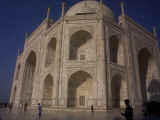 The moment we pop through the entranceway and get our first, full
glimpse of the magnificent structure, I'm simply stunned with its heart-wrenching splendor
and elegance. The Taj seems to hold a magnificent, sensual beauty that's nearly impossible
to describe in mere words, although I'm not the first to try. The poet Rabindranath Tagore
described the Taj as "tear that would hang on the cheek of time". Well, I don't
know about all that, but the huge onion-shaped white marble domes, perched atop the huge
blocks of the pure white marble, meticulously and painstakingly inlaid with millions of
tiny precious and semi-precious stones, truly make for a sight that's as wonderful and
amazing as anything else I've ever seen. What an incredible work of art. Our guide book
tells us that 20,000 people worked continuously for 21 years on the construction of this
magnificent monument. In total man hours that’s - let's see, 365 times 20,000, about
7,300,000; times 20 years . . . "Excuse me, photo please?" The moment we pop through the entranceway and get our first, full
glimpse of the magnificent structure, I'm simply stunned with its heart-wrenching splendor
and elegance. The Taj seems to hold a magnificent, sensual beauty that's nearly impossible
to describe in mere words, although I'm not the first to try. The poet Rabindranath Tagore
described the Taj as "tear that would hang on the cheek of time". Well, I don't
know about all that, but the huge onion-shaped white marble domes, perched atop the huge
blocks of the pure white marble, meticulously and painstakingly inlaid with millions of
tiny precious and semi-precious stones, truly make for a sight that's as wonderful and
amazing as anything else I've ever seen. What an incredible work of art. Our guide book
tells us that 20,000 people worked continuously for 21 years on the construction of this
magnificent monument. In total man hours that’s - let's see, 365 times 20,000, about
7,300,000; times 20 years . . . "Excuse me, photo please?"
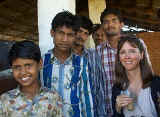 "What?" "What?"
"Photo please?" they repeat, this time in unison.
"Sure" I reply to the three twenty-something Indian men smiling at us,
insta-matics in hand.
Actually, they're much more interested in Laura's picture than mine. And at this
point, I'm almost accustomed to it. For at every temple, every monument, and for that
matter every fort that we visit, we're asked to pose for at least as many photos as we
take ourselves. Both Indian tourists and locals alike, families, young single men, even
groups of school children - all anxious to capture our peculiar image on film, with them,
to show friends and family at home. It seems that the sight of us is as much a novelty to
them, as the scenes and sounds of their unfamiliar land is to us. And, as 'those funny
Americans', what else can we do to help spread goodwill and friendliness throughout this
exotic land; but return a smile, strike a pose, and cheerfully say "cheese!!".
Khajuraho
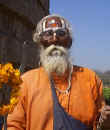 We stand still and rigidly upright, our hands clasped tightly
behind our backs. Laura and I are two of a circle of twenty or so others, all standing
silently together and side-by-side, our heels backed along the rim of a six foot high,
elevated circular stone platform. Rising in front of us, from the center of our circle, is
a mammoth sacred column of solid stone. Suddenly, the somber silence is broken by dueling
gong-strikers, one on either side of the intimate temple area, crushing their small
mallets into their hand-held gongs in an alternating, rapid, and ear-piercing beat. Bing,
bong, bing, bong, bing, bong. Everyone around us begins chanting, gradually raising the
volume in the tiny, dome shaped temple to a near deafening level. We stand still and rigidly upright, our hands clasped tightly
behind our backs. Laura and I are two of a circle of twenty or so others, all standing
silently together and side-by-side, our heels backed along the rim of a six foot high,
elevated circular stone platform. Rising in front of us, from the center of our circle, is
a mammoth sacred column of solid stone. Suddenly, the somber silence is broken by dueling
gong-strikers, one on either side of the intimate temple area, crushing their small
mallets into their hand-held gongs in an alternating, rapid, and ear-piercing beat. Bing,
bong, bing, bong, bing, bong. Everyone around us begins chanting, gradually raising the
volume in the tiny, dome shaped temple to a near deafening level.
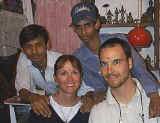 The village priest then joins his chorus of worshipers, and leading
by example, is the first to step in and pay homage and respect to the sacred pillar. The
gong ringing and chanting continues for another 20 minutes or so, as each lauder (with
what felt like the very obvious exception of Laura and I) takes a small step forward,
leans down, and makes a small mental offering finished with a gentle touch, to the holy
monolith. As the ceremony ends, we respectfully follow the others for the few steps around
the circle and towards the side door, stopping briefly before the priest for a blessing of
good luck and a dot of red dye on our foreheads. The village priest then joins his chorus of worshipers, and leading
by example, is the first to step in and pay homage and respect to the sacred pillar. The
gong ringing and chanting continues for another 20 minutes or so, as each lauder (with
what felt like the very obvious exception of Laura and I) takes a small step forward,
leans down, and makes a small mental offering finished with a gentle touch, to the holy
monolith. As the ceremony ends, we respectfully follow the others for the few steps around
the circle and towards the side door, stopping briefly before the priest for a blessing of
good luck and a dot of red dye on our foreheads.
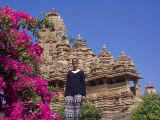 The rare and unusual opportunity to be an outsider witnessing this
daily Hindu temple service, turned out to be a wonderfully unique (and punctuated)
conclusion to our two day visit in Khajuraho, one of north India's most sacred, yet
mysterious villages. The center of the village's being, as well as the attraction for most
of the village's tourists, are the groupings of impressive, yet quite unusual temples
surrounding it. The rare and unusual opportunity to be an outsider witnessing this
daily Hindu temple service, turned out to be a wonderfully unique (and punctuated)
conclusion to our two day visit in Khajuraho, one of north India's most sacred, yet
mysterious villages. The center of the village's being, as well as the attraction for most
of the village's tourists, are the groupings of impressive, yet quite unusual temples
surrounding it.
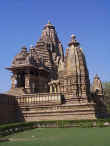 Carved from pink sandstone, these fine examples of medieval
Indian temple architecture are impressive enough from their mere presence. But what makes
them so unique, are the intricately carved erotic images that adorn the majority of their
outside, and some of their inside walls. Religious scholars and art historians alike
remain baffled to this day as to why these images were carved into such holy walls. It all
makes me think that maybe, just maybe, some things are better left unexplained, but simply
enjoyed. Carved from pink sandstone, these fine examples of medieval
Indian temple architecture are impressive enough from their mere presence. But what makes
them so unique, are the intricately carved erotic images that adorn the majority of their
outside, and some of their inside walls. Religious scholars and art historians alike
remain baffled to this day as to why these images were carved into such holy walls. It all
makes me think that maybe, just maybe, some things are better left unexplained, but simply
enjoyed.
Varanasi
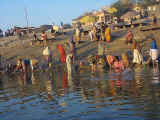 "Is that what I think it is? No, no, no . . . it
can't be!" That's my stammering reaction to first seeing an image that I'm certain
is, now and forever, vividly etched into my eternal memory. I'm utterly positive that
merely closing my eyes will always recall the outline of the head and feet of a crispy,
charred, human form, stretched out across a red-hot pile of burning logs, the fingers of
the scorching, six feet tall orange flames flicking wisps of gray smoke and ash high into
the air. "Is that what I think it is? No, no, no . . . it
can't be!" That's my stammering reaction to first seeing an image that I'm certain
is, now and forever, vividly etched into my eternal memory. I'm utterly positive that
merely closing my eyes will always recall the outline of the head and feet of a crispy,
charred, human form, stretched out across a red-hot pile of burning logs, the fingers of
the scorching, six feet tall orange flames flicking wisps of gray smoke and ash high into
the air.
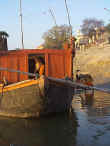 I look around at the five or six other fires, each in various
stages of the three hour cremation ritual, and spot one that has died down. The eldest son
of the deceased gathers the ashes, as well as any unburned bones, and scatters them into
the waters of the holy Ganga River. They're tossed into the flowing current, aside the
whole bodies of sacred cows and people (either holy men, or those who've died via snake
bite are launched into the passing flow intact). I look around at the five or six other fires, each in various
stages of the three hour cremation ritual, and spot one that has died down. The eldest son
of the deceased gathers the ashes, as well as any unburned bones, and scatters them into
the waters of the holy Ganga River. They're tossed into the flowing current, aside the
whole bodies of sacred cows and people (either holy men, or those who've died via snake
bite are launched into the passing flow intact).
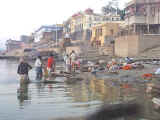 This is life, and death, in Varanasi, a
city held in the highest of holy regard by both Hindus and Buddhists. A city so holy in
fact, that Hindus believe anyone dying here is guaranteed 'moksha', or liberation from the
cycle of death and rebirth. It's this, the inhabitant's 'what the heck, we're here for the
last time' attitude and lifestyle, that manifests itself as a chaotic, tangled, filthy
mess of a city, arguably one of the grimiest in the world. This is life, and death, in Varanasi, a
city held in the highest of holy regard by both Hindus and Buddhists. A city so holy in
fact, that Hindus believe anyone dying here is guaranteed 'moksha', or liberation from the
cycle of death and rebirth. It's this, the inhabitant's 'what the heck, we're here for the
last time' attitude and lifestyle, that manifests itself as a chaotic, tangled, filthy
mess of a city, arguably one of the grimiest in the world.
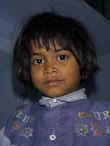 If we look past the gutters on each side of
the streets, acting as open sewers and floating with stagnating pools of waste and
excrement; possibly see beyond the fly covered food garbage and other refuse, scattered
over any flat surface that it happens to land upon. Perhaps if we can forget about the
clouds of dust covering our every inch of being, including the backs of our ticklish and
very dry throats; and simply ignore the smells of car exhaust mixed with both freshly
dropped, as well as freshly burned, animal feces. Then just maybe, just maybe, if we
squint our eyes and release our imaginations, we too will begin to see glimpses of what
the hundreds of thousands of faith-filled pilgrims travel miles and miles to experience -
a peaceful, holy cosmic center, filled with images of the living and the dead, the mortals
and the gods. If we look past the gutters on each side of
the streets, acting as open sewers and floating with stagnating pools of waste and
excrement; possibly see beyond the fly covered food garbage and other refuse, scattered
over any flat surface that it happens to land upon. Perhaps if we can forget about the
clouds of dust covering our every inch of being, including the backs of our ticklish and
very dry throats; and simply ignore the smells of car exhaust mixed with both freshly
dropped, as well as freshly burned, animal feces. Then just maybe, just maybe, if we
squint our eyes and release our imaginations, we too will begin to see glimpses of what
the hundreds of thousands of faith-filled pilgrims travel miles and miles to experience -
a peaceful, holy cosmic center, filled with images of the living and the dead, the mortals
and the gods.
|



